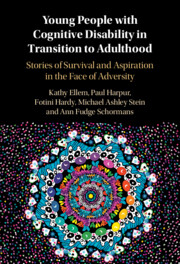 Young People with Cognitive Disability in Transition to Adulthood
Young People with Cognitive Disability in Transition to Adulthood Book contents
- Young People with Cognitive Disability in Transition to Adulthood
- Young People with Cognitive Disability in Transition to Adulthood
- Copyright page
- Dedication
- Epigraph
- Contents
- Figures
- Tables
- Preface
- Acknowledgements
- Chapter 1 Introduction
- Chapter 2 Violence against Young People with Cognitive Disability
- Chapter 3 Working in Partnership with People with Lived Experience
- Chapter 4 Amethyst’s Story
- Chapter 5 Experiences of Young People with Cognitive Disability
- Chapter 6 The Many Faces of Violence
- Chapter 7 Young People and the National Disability Insurance Scheme
- Chapter 8 Don’t Give Up on Us
- Chapter 9 Housing, Home, and Mental Well-Being
- Chapter 10 Young People’s Experiences of the Child Protection and Criminal Justice Systems
- Chapter 11 Having Someone in Your Corner
- Chapter 12 In the Voices of Participants
- References
- Index
Chapter 5 - Experiences of Young People with Cognitive Disability
The Complex Road to Adulthood
Published online by Cambridge University Press: 06 February 2025
- Young People with Cognitive Disability in Transition to Adulthood
- Young People with Cognitive Disability in Transition to Adulthood
- Copyright page
- Dedication
- Epigraph
- Contents
- Figures
- Tables
- Preface
- Acknowledgements
- Chapter 1 Introduction
- Chapter 2 Violence against Young People with Cognitive Disability
- Chapter 3 Working in Partnership with People with Lived Experience
- Chapter 4 Amethyst’s Story
- Chapter 5 Experiences of Young People with Cognitive Disability
- Chapter 6 The Many Faces of Violence
- Chapter 7 Young People and the National Disability Insurance Scheme
- Chapter 8 Don’t Give Up on Us
- Chapter 9 Housing, Home, and Mental Well-Being
- Chapter 10 Young People’s Experiences of the Child Protection and Criminal Justice Systems
- Chapter 11 Having Someone in Your Corner
- Chapter 12 In the Voices of Participants
- References
- Index
Summary
Becoming an adult involved lots of changes and challenges for young people with cognitive disability. Many services, and sometimes families, judged young people badly because they had a cognitive disability. Young people needed help to be independent, but this wasn’t always given to them. Some young people were lonely and found so-called friends who abused them. Aboriginal and/or Torres Strait Islander young people and young people from culturally and linguistically diverse backgrounds needed others to understand and respect their culture. LQBTIQA+ young people wanted love and acceptance as they became adults.
Keywords
- Type
- Chapter
- Information
- Young People with Cognitive Disability in Transition to AdulthoodStories of Survival and Aspiration in the Face of Adversity, pp. 77 - 105Publisher: Cambridge University PressPrint publication year: 2025
